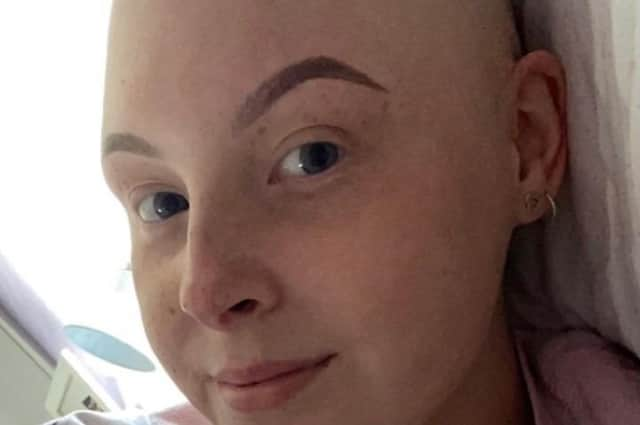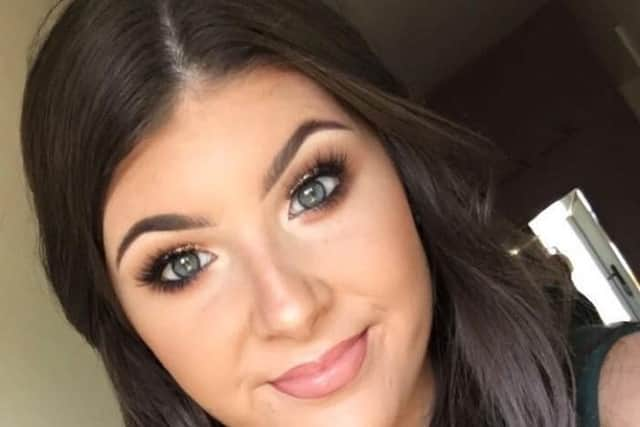Amy Curran from Downpatrick, who was diagnosed with cancer at 20, is backing Teenage Cancer Trust’s new ‘what not to say’ campaign


Downpatrick woman Amy Curran, now 23, who was diagnosed with Hodgkin Lymphoma three years ago, is joining young people across the UK to share the most uncomfortable, bizarre, and insensitive things people have said to them during cancer treatment as part of Teenage Cancer Trust’s new ‘what not to say’ campaign.
From comments like ‘can I try on your wig?’ to ‘my dog died of cancer,’ and outlandish speculation that somebody’s cancer was caused by eating chocolate spread, those involved like Amy are appealing for people to take a moment to think before they speak.
Advertisement
Hide AdAdvertisement
Hide AdThey are also hoping to improve the lives of others by sharing tips about the most helpful things that people said or did to help them through treatment on the charity’s website.


Teenage Cancer Trust, which provides expert nursing care and support to those aged 13-24, put a call out to young people to contribute their experiences earlier this year. As part of the campaign Amy has shared how comments about her hair loss and wig had an impact.
Amy said: “One thing that was said to me and was quite personally upsetting was ‘Is that a wig?’ Or ’Has your own hair grown back yet?’ For most people going though treatment losing hair is an extremely distressing side effect. I have even experienced people saying, ’Take your wig off and let us see what length your real hair is!’
“My advice would be, just don't mention it unless the person wearing a wig mentions it to you. It's hard enough dealing with having no control of what side effects your treatment may be causing without having to worry about the extra pressure of your appearance.”
Advertisement
Hide AdAdvertisement
Hide AdAmy has also shared how the ‘fighting talk’ around cancer can be difficult to deal with.
She said: “Another thing I found unhelpful was people saying, ‘You’re such a hero/warrior!’ Or referring to cancer as a ‘battle/fight’. I understand this is usually coming from a good place and people are only respecting how much difficulty you have faced, but I think that most people with cancer don’t want to be hailed as heroes as we are not doing this voluntarily, we have no option!”
The negative experiences shared by Amy and others supported by Teenage Cancer Trust have been grouped into five main areas to avoid when talking to someone with cancer.
Please don’t tell us about your relatives or pets that died of cancer - or ask when we’re going to die
Advertisement
Hide AdAdvertisement
Hide AdMany said comments like this were deeply upsetting and unhelpful.
Speculate about why we got cancer
Some had felt blamed by others for getting cancer because of their lifestyle – for example something they ate.
Talk about our wigs or how our appearance has changed
Your appearance can be affected by cancer treatment – you might lose hair and wear a wig, have scarring or lose or gain a lot of weight. Young people including Amy said that it isn’t helpful to have any of this pointed out.
Tell us we’re brave
Some said they didn’t feel brave – that treatment was just something they had no choice other than to go through, and that ‘fighting’ language around cancer could feel isolating.
Nothing at all
Advertisement
Hide AdAdvertisement
Hide AdSome found friends ceased contact and disappeared during their treatment, most likely caused by awkwardness and not knowing what to say - but stressed that it’s important to stay in touch.
Amy has also shared some of the most positive and helpful things that people said or did during her cancer treatment, and has contributed her tips to a new page on the charity’s website: www.teenagecancertrust.org/say
Amy said: “A good thing to say to someone you know going through treatment may be ‘if you ever feel like talking, I am here to listen.’ They may not even necessarily want to talk about treatment, I found it nice to sometimes just talk about anything and everything just to take my mind off treatment for a while.
“Try and treat the person the same way as you did before and not let cancer to get in the way of your friendships or relationships. I personally tried to maintain as much normality as possible during my treatment and found that this was something that really helped me. I couldn’t necessarily meet up with friends but would video call and text them often and they would keep me up to date with things that were going on in work or in each other's lives.”
Advertisement
Hide AdAdvertisement
Hide AdAmy harding, Director of Services, Teenage Cancer Trust, said:
“People can feel awkward talking about cancer and blurting out the wrong thing but it’s so important to stay in touch.
“If you’re struggling to find the right words to talk to a friend, loved one or colleague with cancer, please take a minute to look at the brilliant tips that the young people we support have shared on our website about the most helpful and positive things people said or did when they were at their lowest.
“From simple things like staying connected by sending messages or asking someone if they want to talk– we shouldn’t underestimate how much the little things we say or do can make a difference to people going through a tough time.”
Advertisement
Hide AdAdvertisement
Hide AdVisit www.teenagecancertrust.org/say for further information.
75 young people in Northern Ireland aged 13-24 are diagnosed with cancer every year.
Amy was treated at Ulster Hospital in Dundonald. She was helped by Lisa, a Teenage Cancer Trust Clinical Nurse Specialist, one of two nurses in NI funded by the charity who are specially trained to support young people.